Mountains Come Out Of The Sky: What lies ahead for Anderson, Rabin & Wakeman?
We hopped over to LA instead to witness the “dream team" that is Anderson, Rabin & Wakeman, and find out what the future has in store for the supergroup
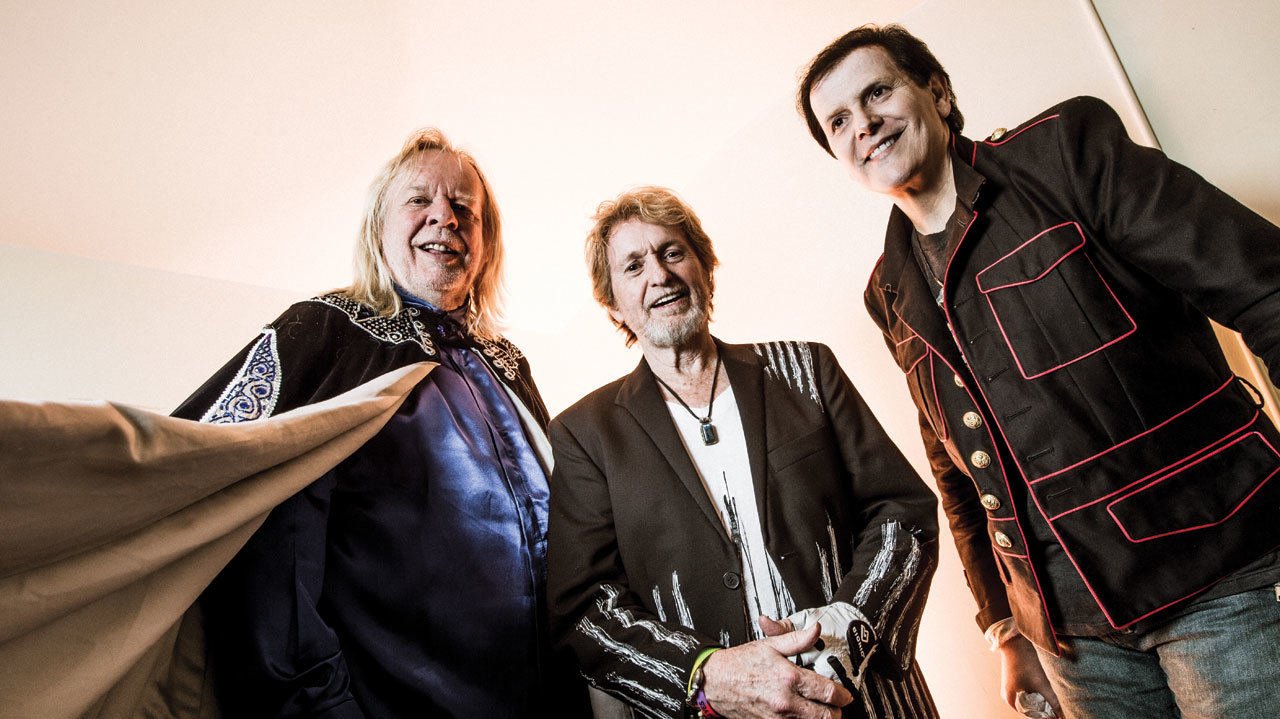
Rectum. The word is written on a piece of paper Trevor Rabin has just plucked from the headstock of his guitar. Every night it’s a different word or phrase. Rabin never knows what it’s going to be, but he knows what his mission is: he has to insert whatever’s written down into the lyric of the song he’s about to sing, without anyone in the audience noticing. It’s the kind of game you play when you’ve been on tour for a while and your keyboard player is the eternally playful Rick Wakeman.
ARW have been on the road for nine weeks, and they’re battered – a virus has carved its way through the band and crew with scant regard for its targets – but clearly Jon Anderson, looking relaxed after a rapturously received show at the regal Orpheum theatre in downtown Los Angeles. “Within two weeks you start to glide, and in the third week you’re implanted, locked in. And from then on it’s a joy.”
There’s a lot of joy on this tour, and Wakeman’s game sums it up. “It actually got to the point where it’s hard to remember a way of integrating Rick’s choices without forgetting the lyrics of the song,” says Rabin, his South African burr softened by decades in the Californian sun. “The only reason I know I’m singing the wrong words is because I’ll look out into the audience and spot people singing them right.”
This, ladies and gentlemen, is ARW on the road. And it turns out they’ve been playing this game for the best part of 30 years. “It started on the Union tour,” says Wakeman. “I would wander down to Trevor and whisper a word in his ear, and he would have to get that word into the next song. It was hilarious, and the lyrics go by so quickly that no one really notices. It was simple words at first, like ‘hedgehog’, but the toughest one was on the last night of the tour, when I gave him ‘menstrual cycle’, and Trevor got it in without anyone noticing. It was just sensational.”
The band’s current shows, branded An Evening Of Yes Music & More for the benefit of uncertain ticket holders, are also sensational. Old songs have been given a fresh lick of paint. Newer songs have been performed with the kind of youthful vigour that belies the age of those involved. The five musicians onstage are apparently having the time of their lives. And despite those tour posters proclaiming the names of the three oldest hands, Anderson, Rabin and Wakeman are all keen to emphasise how this project is not just about them. It’s a five-piece. A real band. A band with ambition. Just like Yes.
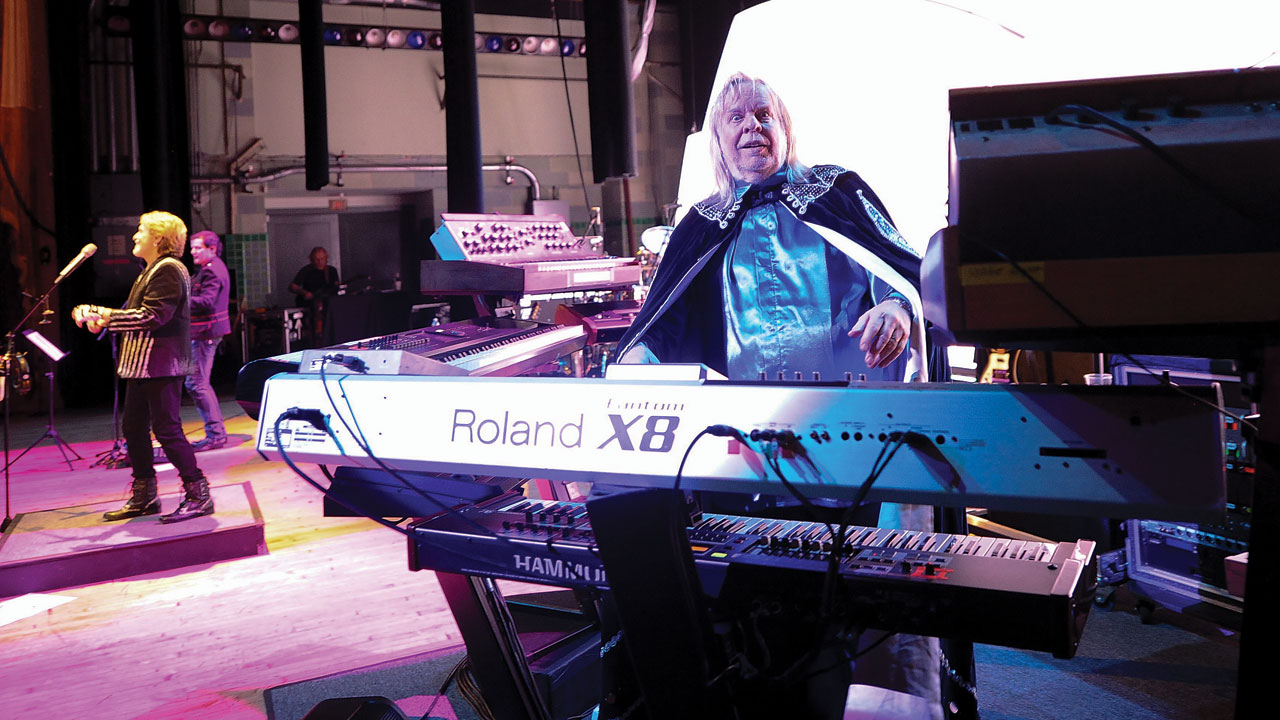
Except that it’s not just like Yes. While Steve Howe and co. are doing a perfectly good job of bringing a perfectly good facsimile of the original band to slowly dwindling masses, ARW feel like they’re operating on a curve that’s headed rapidly upwards. And it’s not just a temporary project.
“A few shows into the tour, we called a meeting and decided this was a long-term thing,” says Wakeman. “We had UK dates and various things planned, but there were no guarantees about how anything was going to turn out. We knew in rehearsal that we had something special, but you don’t really know if it’s going to work until you go out and play and someone injects you with three-and-a-half tons of adrenaline. Yes is very much a team, and we’ve ended up with a dream team.”
Sign up below to get the latest from Prog, plus exclusive special offers, direct to your inbox!
In conversation, Wakeman, Anderson and Rabin all refer to themselves as both ARW and Yes. These might be slips of the tongue, ancient habits dying hard, but it does demonstrate the mindset they all have, as if they’re on a mission to bring Yes music back to where it should be, to elevate it to places it hasn’t been before, and to give their audience the Yes music they deserve.
“I never left Yes,” says Anderson, speaking figuratively. “It’s part of my being, and I kept doing Yes music in my head. The nearest thing I did was Invention [Invention Of Knowledge, last year’s collaboration with Flower Kings mainman Roine Stolt], which was a definite ploy to bring forward something that was missing in my understanding of Yes. Whenever I heard what Yes were doing as a band, I’d think, ‘No, it should be like this.’ If you’re going to go for it, go for it. Don’t piddle about.”
If there’s one thing you can’t accuse ARW of doing, it’s piddling about. “We don’t take anything for granted,” says Wakeman. “An unbelievable amount of preparation went into ARW. It wasn’t a spur-of‑the-moment thing. Jon and I started talking about this in 2009. Trevor flew to London and we talked about what we wanted it to be, and we all agreed that if we couldn’t be as good as we wanted to be then there was no point in even trying.”
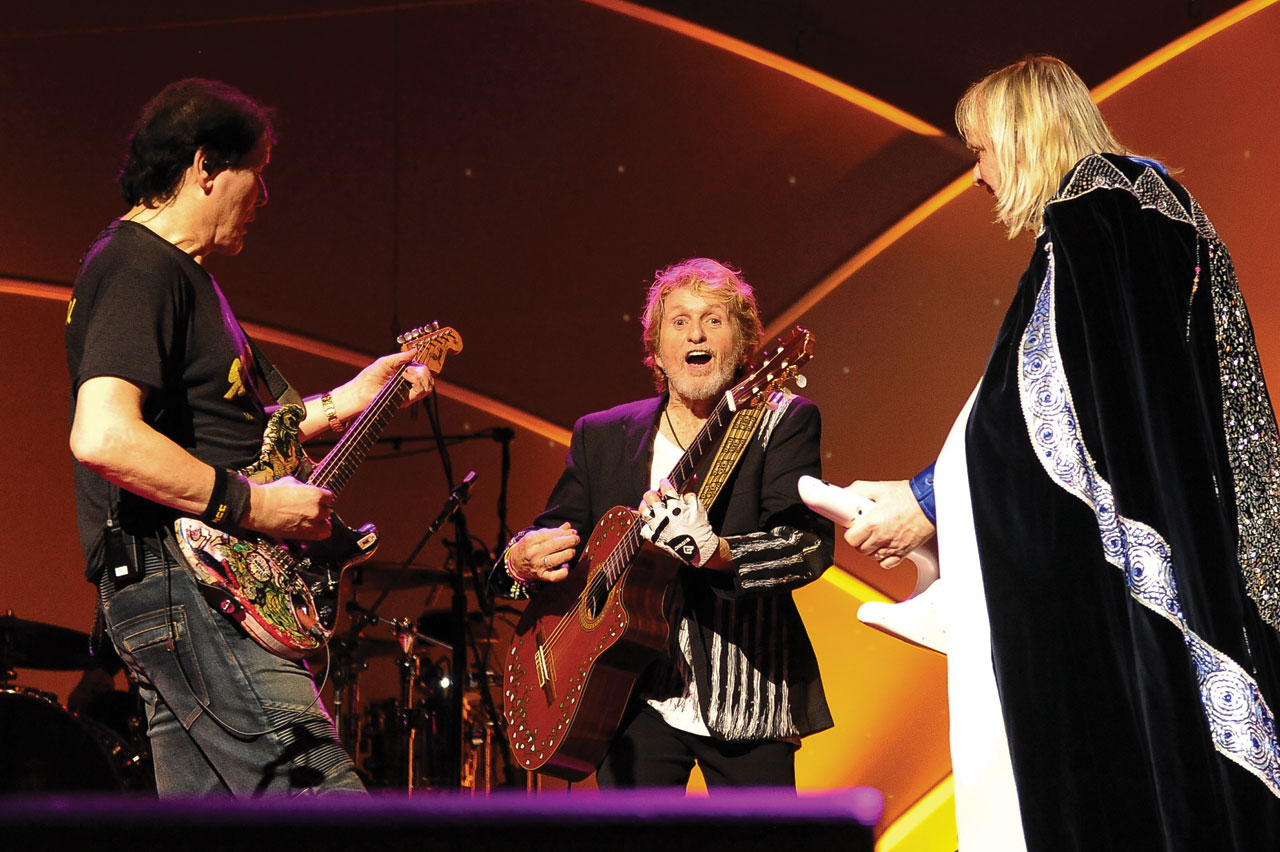
Onstage in Los Angeles, the band Wakeman describes as “the line-up of Yes with the most musicianship” are a genuine force to be reckoned with. From the opening snap of Cinema to Roundabout’s exultant finale, ARW are deliriously good, and it’s more than nostalgia. For a start, Jon Anderson is singing better than he has in years. “Jon has worked hard,” says Wakeman. “He’s been very sensible, and he’s realised his voice is an instrument that needs to be looked after, just like any other instrument. After he was ill, we did the Duo tour together and his voice was getting better, but wasn’t as strong as it had been. But he knows so much more about being able to control it now, and there’s no way Jon could have been part of ARW if he didn’t think he could perform as well as people remember. And guess what? It’s as good as it ever was.”
But that’s not all. There’s a confident chemistry between the musicians that belies the fact that they haven’t toured together for more than 20 years. “That’s the great thing about this band,” says Wakeman. “Everyone listens to each other. I know everything Trevor’s playing, and Trevor knows everything I’m playing, and we all know what Jon’s doing. Trevor might do something he might not normally do and I might do something I don’t normally do, but somehow the other person expects it. There’s a kind of musical telepathy that goes on which is really nice.”
“It’s a unique thing,” says Rabin. “We’ve got to a point where we know the next note each of us is going to play, and consequently the lock-in is pretty amazing. Every night I get amazed at how I’ll be doing something and going somewhere new, and Rick will be there alongside me. It’s pretty uncanny in some senses, and obviously doesn’t hurt that we have a lot of love for each other. That wasn’t always the case with Yes, but with this band there’s literally not one day where there isn’t a desire to be together and for me, Jon and Rick to play together.”
“It’s harmony, in every sense,” says Anderson. “Where the band of musicians are in harmony, where’s they’re in love with each other musically, where they’re brothers. Yes has had these periods before. When we did Fragile and Close To The Edge, we had that harmony. And the next time was during Going For The One, because Rick had returned, and then again during 90125, which was radically hip and incredibly produced, but had harmony. ABWH [Anderson Bruford Wakeman Howe] was in harmony, and this is in harmony. Getting rid of ego is important. Like Quincy Jones said, “Check your egos at the door!”
This approach is reflected in the live show, where Rabin and Wakeman don’t get solo spotlights, but new boys Louis Molino and Lee Pomeroy do. Molino’s stainless steel kit gets a well-received thrashing before Lift Me Up starts, while Pomeroy pays tribute to Chris Squire with a startling rendition of The Fish (Schindleria Praematurus) that starts off by remaining faithful to the original before wandering off to explore more uncharted territory.
“When we first rehearsed, he did it note by note,” says Wakeman. “It was really true to the original, and Jon suggested he took it to the next level. Lee didn’t want to do anything that would upset Chris’ fans, but Jon insisted that exploring further would really honour Chris’ spirit. The first time he played it you could sense a little bit of apprehension, but I stood onstage watching mouths drop in the audience. Thanks to social media, it was all over the internet within an hour of the show’s finish, and that was great because it meant from that point on, the audiences were ready and waiting for it.”
The exploration doesn’t stop there. Every song has been broken down and new parts added before being carefully reassembled and polished. None of this is done for change’s sake, but to add further depth to songs that are firmly ingrained within their audience’s consciousness.
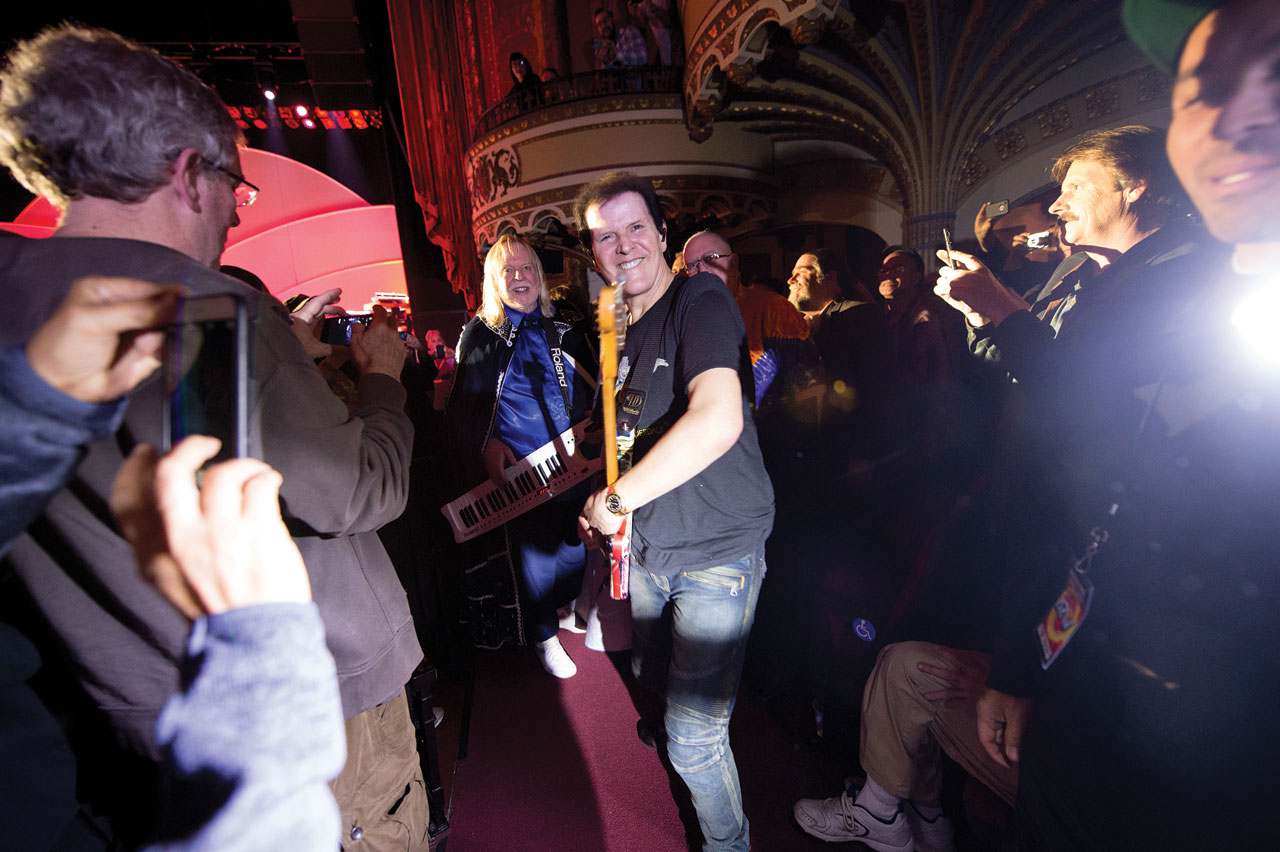
“Some of the lines have to be kept in because they’re the lines that people recognise,” says Wakeman. “They’re the glue and the catalyst. But I could look at 90125 or Big Generator and study the pieces harder than I’d ever studied them before. And I could imagine what melodies I’d have played if I’d been in the band, and what sounds I would have chosen, and what instruments I would have used. Trevor did exactly the same. For example, on Awaken he didn’t want to play pedal steel so he came across another way of doing it. And this is a fantastic way to work because it inspires everyone to work in a different way, but it doesn’t take anything away from the original pieces.
“Then Jon suggested taking it one step further, by taking the pieces we did play on and examining them again to see if anything could be done differently. For example, on And You And I, I always felt there should be another Minimoog line that joins the first and second verses together. So I put it in, and Jon says he doesn’t ever want me to take it out, and now it’s hard to think of the original without thinking of the new part. Or with Owner Of A Lonely Heart, where there wasn’t much going on for me originally, apart from the symphonic stabs, so I’ve added some new parts and Trevor loves them.”
In LA, Owner Of A Lonely Heart is spectacular, and not just because Rabin and a keytar-wearing Wakeman spend much of an elongated instrumental break roaming the aisles, soloing madly. Back on stage, the band are joined by Rabin’s son Ryan, drummer in indie band Grouplove, who takes Molino’s stool and proceeds to look as if he were born into the job. “It’s so amazing,” says his proud father. “We never rehearsed it. Not even a soundcheck. He’s just such a natural. I was completely confident he could do it, but I was shocked at how well he did it.”
For a man who hasn’t stepped onstage for 20 years, Rabin appears liberated. “It’s amazing,” he says, for what seems like the 20th time. “I wasn’t apprehensive about working with Jon and Rick again – they’re both so supportive, and I always knew I’d work with Rick again after the Union tour – but playing live felt like jumping into an ice-cold swimming pool. Before the first show I was absolutely terrified, but after the first song I adapted to the water and found it very warm!
“I’m in the great position where I’ve done 50 films and don’t have to do every single thing that comes along to keep the career going,” he continues. “I can relax a little bit and take on projects with people I’ve worked with before, people I find really interesting. So I think ARW will certainly be the priority for the foreseeable future.”
Ah. The future. Ask Jon Anderson about the new music ARW are working on and his eyes light up. “It’s powerful,” he says. “It’s wild, crazy, surreal, classic, what-the-hell-is-this Yes.”
And with two branches of the Yes franchise now running in parallel, and members of each booking hotel rooms in New York in April to coincide with the band’s induction into the Rock And Roll Hall Of Fame, it’s only natural to wonder if the current members of the band being celebrated will glance across at the members of ARW, look at what they’re doing with those old songs, and what they’re planning with the new, and admit that the baton has been passed.
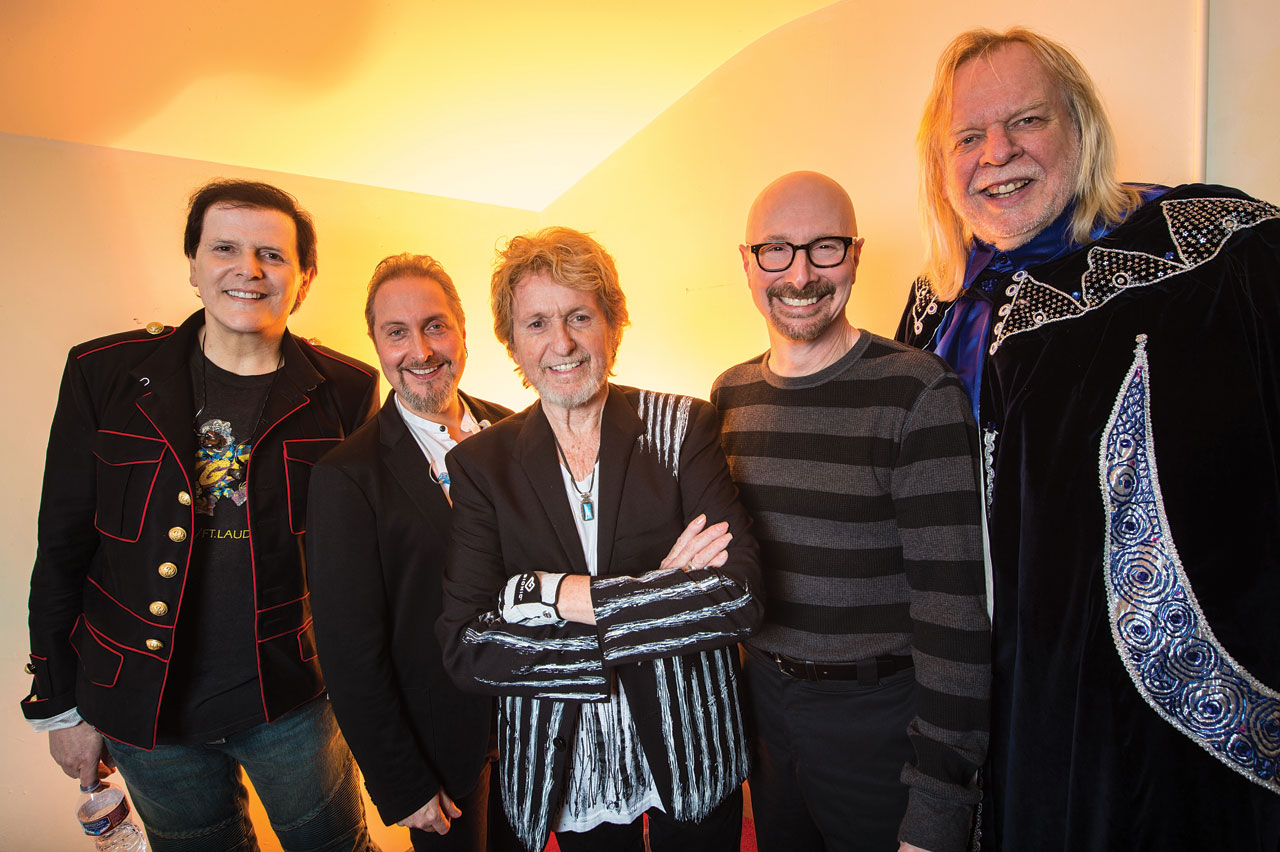
In the meantime, there’s going to be a break, and then the band’s European tour, and maybe something else. “We’ve recorded all of the shows we’ve done,” says Rabin, “and the intention is that we’ll be listening to most of them to see if we can put together a live record. And if everything continues as discussed, we’ll be filming and recording both shows at Hammersmith Odeon. Along with that we’ve got the new stuff we’ve been working on, which we want to get moving and get ready for release.”
Anderson offers a few clues. “We’d like to make a record that people get a chance to hear and see, because these days music is such a visual experience. It always has been, from Singin’ In The Rain to The Beatles, but while we’ve made some good videos, we’ve never made a great video. We want to create a great musical event and project it out into the world. We have the music, but for it to reach more people, they have to be able to see it as well as hear it. I said when we started that I didn’t see any point in doing an album, and that we might do two or three songs every six months, but somehow visualise them.”
There are also clues to the band’s future in the past. When ARW started rehearsing, they were a six-piece, with an additional keyboard player/guitarist in place. “When Trevor records, he has another two or three guitars,” says Anderson, “so I though it would be useful to have someone who could orchestrate more and bring it to the next level, perhaps making it more cinematic. But it worked out that what we’re doing now is exactly right, because we’re performing Yes music, and the cinematic stuff will come with the new music we’ve been working on.”
It’s easy to view Anderson, with his gentle demeanour and New Age trim (he still speaks with that lovely Accrington lilt, and wears a wristband adorned with the phrase ‘Peace and Love’) as a quaint oddity, a man out of step with the times, but it’s clear he’s in the driving seat, a bandleader in a group staffed by exquisitely talented musicians. Wakeman looks out for him – he introduces this writer to Anderson with the words, “Don’t worry, he’s a good doctor,” as if to reassure the singer that I’m not a tabloid journalist on the lookout for salacious gossip – but Anderson’s the guiding light, the one with his eyes on the future.
Ask him what he thinks of modern music and he’s ready with an answer. “I’m hearing something,” he says. “The music business gets into ever-decreasing circles. It does it every 10 years. You have your top 20 famous pop stars monopolising the limelight, and there are a lot of very interesting, very talented musicians struggling to join them, wondering if they have to compromise and become a carbon copy of what’s already there to succeed, or if they can stick to what makes them unique. The end of this period is coming fast, and I think it’s very connected to virtual reality and computer animation. This is the next sensational event in our collective consciousness.”
He’s equally enthusiastic when answering questions about his own music. Bruce Hornsby once said that art was all about the pursuit of euphoric moments, and Prog asks if Yes’ music is very deliberately structured to attain such transcendent peaks.
“Oh yes! Like the middle section of Awaken. It drives in 11⁄4 time in a very organic way, and then these chords come up, and Rick’s playing his theme, and I’m singing an aggressive chant, and where do you go after that? It’s build and build and build, and you go into transcendental meditation music. Then Rick does his remarkable solo and it takes us to the next step, where the chords come back in, but at half time, and from that moment we’re aiming for the big chord at the end. If the audience are with us, great, but it doesn’t really matter because we’re going to do it anyway!
“Yes’ music is all about being open to the adventure of music. I don’t make music for anything but music’s sake. I don’t make it for radio. I hope it’ll get played, but it doesn’t matter if it isn’t because I know that people will find it.”
So that’s the state of Yes’ music in 2017: euphoric, beautiful, progressive, and played by musicians more committed to the cause of that music than anyone. And if it all goes wrong, as it did one night on ARW’s US tour, when a problem with one of Rick Wakeman’s pedals meant that all his keyboards wanted to play at the same time, the band can resort to plan B: Anderson just hands the mic to Wakeman and he does 15 minutes of stand-up. Probably rectum jokes.
ARW continue their An Evening Of Yes Music & More tour in Europe this March. See www.arw-tour.com for the full list of tour dates and more information.
Anderson Rabin Wakeman live review - Los Angeles, Orpheum Theatre
Mike Portnoy: I’d have loved Anderson Rabin Wakeman gig
Anderson, Rabin and Wakeman: the inside story behind this year's biggest reunion

Online Editor at Louder/Classic Rock magazine since 2014. 39 years in music industry, online for 26. Also bylines for: Metal Hammer, Prog Magazine, The Word Magazine, The Guardian, The New Statesman, Saga, Music365. Former Head of Music at Xfm Radio, A&R at Fiction Records, early blogger, ex-roadie, published author. Once appeared in a Cure video dressed as a cowboy, and thinks any situation can be improved by the introduction of cats. Favourite Serbian trumpeter: Dejan Petrović.
